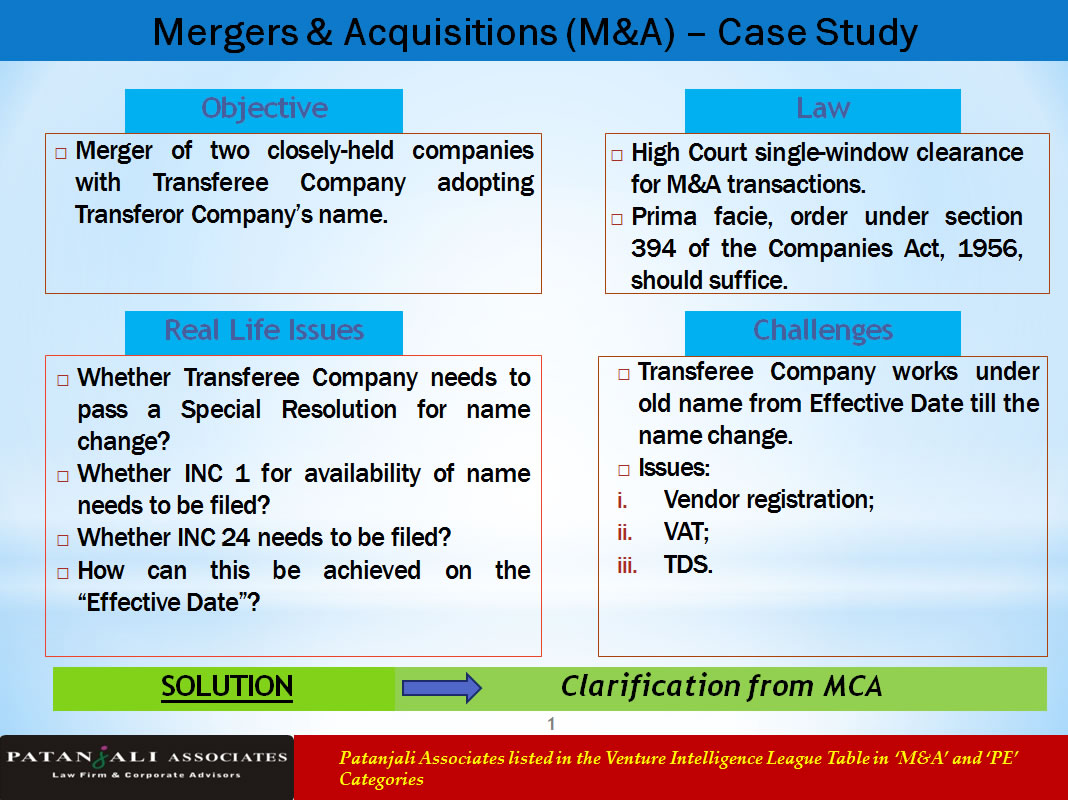ALL ARE HERE
Case Studies

Case Study – I
100% Equity Divestment by Indian Promoters to Overseas Buyer
Patanjali Associates represented the Indian Promoters
Issue
IP issues pertaining to software generated from open source
Accomplishment
Buyer did not agree to Escrow amount and indemnity became expensive and specific instead of generic indemnity.
Strategy
- Identify the open source license cost.
- Evaluate use of open source against licensed software
- Negotiate the purchase price on the validated exposure and … it into escrow amount.
- Fix floor and cap for indemnities
- Stipulate of time period for indemnity
Challenges
- Being Seller’s counsel, objective was to facilitate closing and minimize indemnity risks as also Escrow amount
Lesson
- Extensive DD has issues highlighted came too late.
- Keep insurance cover ready.
Case Study – II
Strategic investment in Agriculture Risk Solution and Weather related
information company
Patanjali Associates represented the Investor
Issue
- Being a startup, the DD demonstrated regulatory and statutory compliance gaps.
Strategy
- Conducted an ABC analysis on the regulatory and statutory compliance gaps
- Based on discussions with the client and the company, classified the gaps into CPs and CSs
- Allocated time period for conditions subsequent and the transaction document provided a monitory mechanism through Board.
Challenges
- While the company was willing to follow the compliances, the process was both time consuming and expensive and had chances of delaying or breaking of transactions
Virtual In-House Legal Counsel Support

Get Free Consultation for your case
Get Free Consultation now, fill in the form and we will get back to you as early as possible…
Introduction
In the realm of business transactions, equity divestments often present intricate challenges that require careful consideration. This blog post delves into a compelling case study involving Indian promoters and an overseas buyer, and how Patanjali Associates successfully tackled the complexities of IP issues arising from open-source software in a cross-border equity divestment.
The Scenario: 100% Equity Divestment
The case revolved around Indian promoters looking to divest their entire equity stake to an overseas buyer. While the prospect of such a transaction was promising, there was a significant hurdle to overcome: the potential intellectual property (IP) issues stemming from software generated using open source components.
Addressing the Challenge: From Generic to Specific Indemnity
One of the most significant challenges arose during negotiations when the buyer declined to agree to the standard escrow amount. This led to the need for an indemnity arrangement that was both customized and more expensive. Patanjali Associates orchestrated a strategic approach to tackle this challenge:
- Open Source License Cost Identification: The team meticulously identified the costs associated with open source licenses.
- Comparative Evaluation: A thorough evaluation was conducted to compare the use of open source software against licensed alternatives.
- Negotiating Purchase Price: Negotiations were based on validated exposures, with the additional cost being incorporated into the escrow amount.
- Indemnity Boundaries: Defining the limits of indemnities, including setting a floor and cap for these provisions.
- Timely Stipulations: Establishing a well-defined time period for indemnity coverage.
Balancing Act: Closing and Indemnity Mitigation
One of the primary objectives of Patanjali Associates as the seller’s legal counsel was to facilitate a smooth closure of the deal while also minimizing indemnity risks and the escrow amount. This required a delicate balancing act to ensure the interests of both parties were taken into account.
Lessons Learned: Early Due Diligence and Preparedness
The case study underscored the significance of conducting comprehensive due diligence early in the transaction process. Waiting until later stages to address identified issues could lead to complications. Additionally, the importance of having insurance cover prepared in advance was highlighted as a valuable risk-mitigation strategy.
Conclusion
The case study of this cross-border equity divestment illustrates how legal challenges, particularly those involving IP issues, can be overcome with strategic planning and negotiation. Patanjali Associates’ approach serves as a valuable lesson for legal practitioners and businesses embarking on similar transactions.

